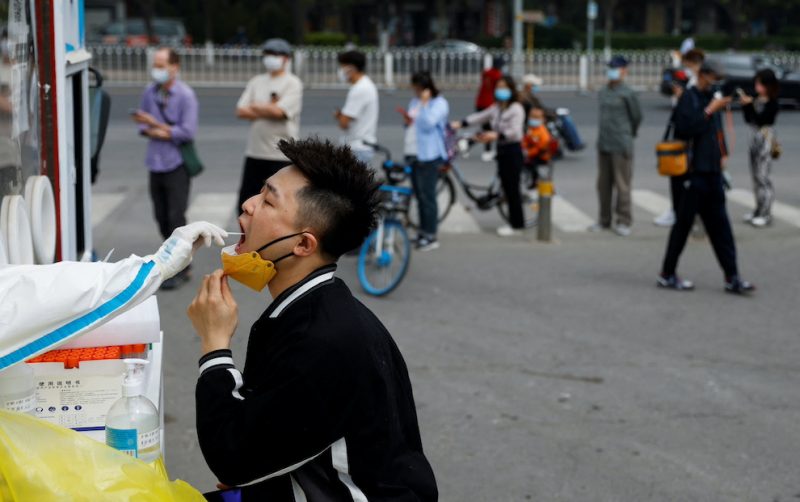Residents in Beijing were preparing for a possible nightmare scenario, rushing to buy food, toilet paper and other supplies, as the city’s biggest district started mass testing of residents.
Late on Sunday, officials informed residents and people who work in Chaoyang district they will be tested three times this week because “hidden” Covid infections had been found among different groups in the city over the past week.
Chaoyang is home to nearly 3.5 million people.
Not surprisingly, the news has sparked fears of a lockdown similar to Shanghai, where most of its 25 million residents have been stuck in their homes for up to four weeks because authorities are yet to contain the latest wave of infections.
“I’m preparing for the worst,” said a graduate student in the nearby Haidian district surnamed Zhang, who placed online orders for dozens of snacks and 10 pounds of apples.
Shoppers in the city crowded stores and online platforms to stock up on leafy vegetables, fresh meat, instant noodles and rolls of toilet paper.
In Shanghai, the main food supply bottleneck has been the lack of enough couriers to make deliveries to homes, fuelling anger among residents.
In Beijing, supermarket chains including Carrefour and Wumart said they had more than doubled inventories, while Meituan’s grocery-focused e-commerce platform increased stocks and the number of staff for sorting and delivery, according to the state-backed Beijing Daily.
Since Friday, Beijing has reported 70 locally transmitted cases in eight of its 16 districts, with Chaoyang accounting for 46 of the total, said a local health official on Monday.
Even in districts such as Haidian that have yet to report any cases in the current outbreak, there is a sense of growing unease over food supply.
Chinese Shares Plunge
While the Chinese capital’s caseload is small compared to those globally and the hundreds of thousands in Shanghai, Chaoyang district told residents to reduce public activities, although most schools, stores and offices remained open.
Chinese shares tumbled on Monday, with the blue-chip CSI300 index closing down 4.9% at a two-year low, weighed by worries Beijing was on the verge of joining Shanghai in lockdowns.
The Shanghai Composite Index slumped 5.1%.
The Chaoyang district is home to many wealthy residents, most foreign embassies as well as entertainment venues and corporate headquarters. It has little manufacturing.
“The current outbreak in Beijing is spreading stealthily from sources that remained unknown yet and is developing rapidly,” a municipality official said on Sunday.
More than a dozen buildings in Chaoyang have been put under lockdown. For the rest of the district, people were to be tested on Monday and again on Wednesday and Friday.
On Monday morning, people queued at makeshift testing sites manned by medical workers in protective suits. Under mass testing campaigns in China, multiple samples are tested together.
“I came as the notice suggested, at 6am, for testing just to make sure that I can get to work on time,” said a man in his 30s queuing for a test in his residential compound.
By the early afternoon, movement restrictions in one part of Chaoyang were tightened, with residents told not to leave the area at all and not to leave their local compounds for non-essential reasons, state television reported.
• Reuters with additional editing by Jim Pollard
The photo on this report was changed (for a new one) on April 25, 2022.
ALSO on AF:
Chinese Yuan Slips to One-Year Lows, Extending Losses
Asian Stocks Slide, Dollar Soars As Rate Hike Concerns Weigh
Shanghai Data Shows Severe Retail Slump in March
























